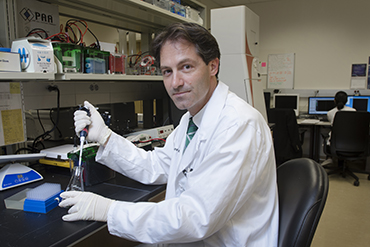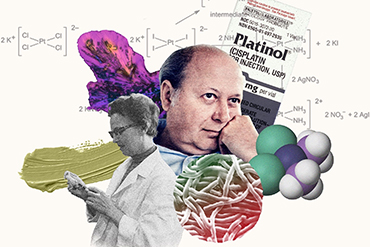
New genetic syndrome identified in 3-year-old patient
A Michigan State University pediatric researcher and a Spectrum Health physician have identified a new genetic syndrome in a 3-year-old girl who, for more than two years, has gone undiagnosed.
The discovery is the first to link a particular gene, known as ODC1, or ornithine decarboxylase, to developmental problems in a human, something that up until now, has been only seen in mice.

Discovering the gold standard of cancer drugs
More than 40 years ago, the anti-cancer drug cisplatin was approved by the Food and Drug Administration. It was an event significant to cancer patients and the medical community, but also to Michigan State University’s research legacy.
The chemical compound—which prevents the DNA in cancer cells from replicating, confusing them and causing them to die—is used to treat many types of cancer, but is most widely prescribed for testicular, ovarian, bladder, lung and stomach cancers. With a cure rate north of 90 percent for testicular cancer, cisplatin has become the gold standard to which many new cancer medicines are compared.

Neuroblastoma researcher investigates promising new treatment
The St. Baldrick’s Foundation, the largest private funder of childhood cancer research grants, has awarded a nearly $100,000 grant to support a Michigan State University scientist’s study of a promising new treatment for neuroblastoma, an often-fatal pediatric cancer.
For 17 years, André Bachmann, professor of pediatrics and the College of Human Medicine’s associate chair for research, has spearheaded preclinical research on a drug called DFMO, or difluoromethylornithine, as a potential weapon against neuroblastoma. DFMO was developed in 1978 and is extremely effective as the front-line therapy against West African sleeping sickness.

Virus-like particle could lead to new cancer vaccine
Michigan State University scientists are engineering a virus-like particle, known as Qβ, that will generate anti-cancer immune responses in the body and potentially be used as a new vaccine for the treatment of cancer.
The project, funded by a $2.4 million grant from the National Cancer Institute, will support the development of the vaccine to protect animals against cancerous cells that are currently untreatable, and could easily translate to vaccines for humans’ use of spontaneously occurring cancers.
